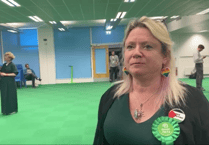Cuts to a rural bus service that takes people into Bath have forced workers to change jobs, massively increased journey times and left residents feeling cut off, a campaigner has claimed.
Clive Turner painted the stark picture for B&NES Council members as residents prepare to submit a petition against the shake-up of the 179.
He has met with a group of parish councillors seeking a solution for the route, which now runs from Midsomer Norton to Bath via Paulton and Timsbury. Mr Turner told B&NES Council’s Communities, Transport and Environment Policy Scrutiny Panel last week: “I’m speaking on behalf of thousands of people affected by the cuts to the 179 bus service. Since 2017, it has been eroded to an extreme extent. I understand First Bus is looking at stopping it altogether.
“The communities along the 179 route have become domiciles – we are looking in the region of 14,000 people, in Paulton, Timsbury, Tunley. Some areas have no alternative at all.
“We all appreciate that cost is a big factor. Surely it’s not the only aspect on which to make these judgements.”
He said using the same criteria for urban and rural services was like “comparing apples and bananas” and argued the criteria need to include the impact on communities, the environment and the potential clean air regulations.
Councillor Mark Shelford, B&NES Council’s Cabinet Member for Transport and Environment, told the meeting a group was being set up to look at rural bus issues.
Mr Turner told the Local Democracy Reporting Service: “The impact is now so severe that some people have lost or had to give up their jobs, or seriously contemplate moving house. Children’s and students’ journey times have, in some cases, increased three-fold.”
Parish council representatives from communities affected by the cuts came together in Timsbury on Tuesday to find a solution. Mr Turner, a former Parish Councillor for Camerton, said: “There are some very interesting suggestions out there which could resolve the current dilemma, but they need to be thoroughly researched in order to find the ideal solution, and that solution could look very different to what we have had, and have, now.
“We need to keep an open mind and try and find what will work for most people – and accept the fact that the perfect solution for everyone does not exist.”
Veronica Packham, Chair of Timsbury Parish Council, who also joined the meeting, said: “Residents told us the distress they were under, particularly people travelling to work in the morning into Bath and home at the end of the day. The 179 is not empty. In the morning, there are often people standing. Timsbury is regarded as quite a sizeable village. B&NES Council want to add more houses but there are fewer and fewer buses.”
Clutton Parish Council Chair, Rosemary Naish, said: “Keeping good bus services is really important in rural areas, especially in villages where there are no shops, few local jobs or recreation facilities.
“When bus services aren’t able to meet the needs, the result is an increase in social isolation and poverty; from youngsters who can’t get to social activities in the evenings and weekends, to those who haven’t access to a car having problems getting to shops, medical appointments etc.
“So what are we doing about it? I have been able to get £150,000 of section 106 money ring-fenced to set up a community transport solution.
“Since last autumn, I have been attending Parish Council meetings along the 179 route, and I now have commitment from all those parish councils to work together, to find and implement a solution. We are particularly fortunate that First Bus have offered help.
“Obviously, there is a lot of work to be done, gathering and analysing the data, before the best solution can be chosen, but I feel confident that now the community is working together, we will find the right solution.”
Reverend Martin Blewett, Rector of several of the parishes along the 179 route, launched the petition calling on First Bus to reverse the cuts because of his concerns about the impact on vulnerable people.
The petition has more than 800 signatures and is set to be presented to a First Bus representative at Bath Bus Station at noon on Saturday, 2nd February. Many will have to take private transport.
B&NES Council and the West of England Combined Authority said in a joint statement: “Following the decision by First Bus last August to withdraw its commercial bus service 179, B&NES Council sought to rescue as much of the service as it could with the resources at its disposal.
“A two-hourly service between Old Mills Tesco and Bath is provided on Mondays to Fridays with financial support of £11,000 per annum from B&NES Council.
“On Saturdays, one peak hour journey runs in each direction between Timsbury and Bath, with financial support of £5,460 per annum from the council. The Sunday service was withdrawn to release funding to support the Monday to Friday service, which was considered to be a higher priority for travel to work, education and shopping.
“WECA, working with the constituent authorities, is developing a bus strategy to consider how the local bus network can best meet the future needs of the area. One of the key issues it will look at is how sustainable public transport can be provided to rural communities. Also, the Parish Councils along the route are working together to develop a community solution.”
High Littleton resident, Maggi Thomas, said her 90-year-old mum lives in Timsbury, is blind and has dementia, and needs carers. She said: “I have real concerns that I will be unable to source good carers, without their ability to use public transport to get into Bath.
“The viability of my mum being able to spend the rest of her life in her own home becomes questionable. People living in rural areas have far reduced amenities compared to urban dwellers, but we pay comparable council taxes. It doesn’t seem wrong to me for the council to redress some of the imbalance by agreeing to subsidise rural bus services.
“Cutting bus services will not make people fill fewer buses – they will find more convenient options.”
Animator, Damien Valentine, works from home, so does not interact with many people on a daily basis. He relied on the 179 at evenings and weekends and says that after the cuts he is “becoming more and more isolated”.
Mr Valentine said he can get to Birmingham by public transport in two hours, but what was a twenty-minute trip into Bath on a Saturday can now take an hour-and-a-half. He added: “When there’s only a half an hour difference to get between somewhere close and somewhere so far away, there’s something wrong.”
Matt Hayward said part of the attraction of moving to Timsbury five years ago was its close proximity to Bath and the “excellent” evening and weekend bus service, allowing him and his wife to be regular visitors. He added: “Since the removal of the weekend services, we’ve been into Bath just once, and that entailed a bus to Keynsham and a connecting train into Bath. Getting home on the night meant an expensive taxi.
“We prefer to use public transport and leave the car at home. B&NES Council support this notion. Yet, when they introduce the congestion zone in the near future, we are left with no public transport option. I fear Timsbury will soon be renamed to Brigadoon!”
With no pub in Timsbury, Matt’s wife, Donna Hayward-Sloan, said: “It worries me that the lack of a bus service may have an impact on people’s decisions to chance a few beers and drive home. I do hope not, but not everyone can afford the taxis to and from Bath, or neighbouring villages, and might just risk it. It’s a scary thought – especially for those that do choose to walk that country lane.”
Mrs Hayward-Sloan also added she was worried about the impact on the village’s businesses if the bus service were less accessible.





Comments
This article has no comments yet. Be the first to leave a comment.